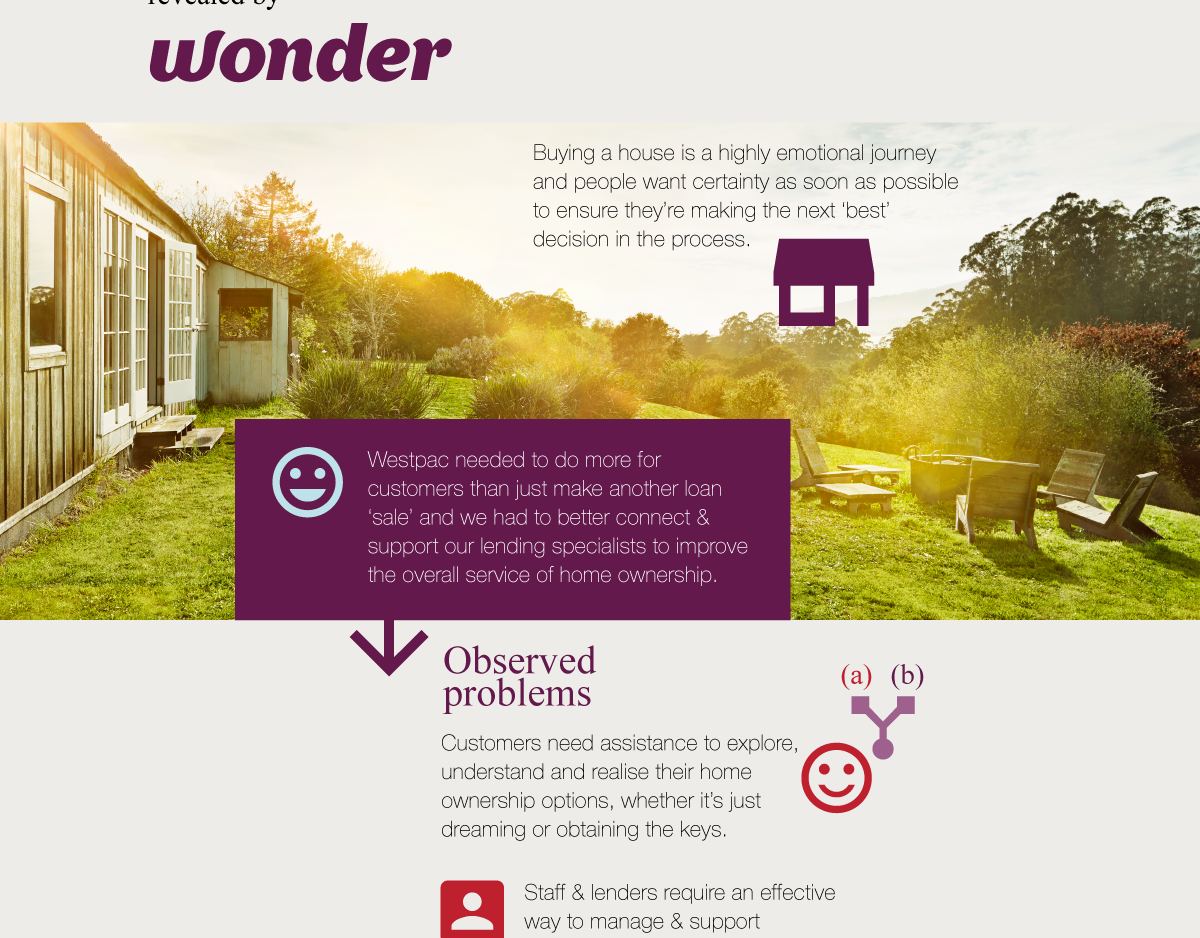Key question:
How do you create a psychologically safe space & a learning environment in order for stakeholders, facilitators, trainers and supervisors to participate in honest, meaningful & truthful conversations...in order to improve / uplift skills for highly experienced social workers?
My role:
Strategic Learning Design Principal
My tasks & responsibilities:
// Learning Strategy development
// Learning approach and program development;
// Facilitation and instruction (train-the-trainer);
// Course material development (visual design layout of eLearning & Miro facilitation boards)
Awards
Australian Institute Training Development
Excellence Awards 2022
Finalist
Best Blended Learning Solution
Finalist
Best Blended Learning Solution
Australian Institute Training Development
Excellence Awards 2022
Highly Commended
Best Blended Learning Solution
Highly Commended
Best Blended Learning Solution
LearnX
Diamond for:
Best Learning Model 2022: Blended
Best Learning Model 2022: Blended
LearnX
Diamond for:
Best Learning & Talent Development
Best Learning & Talent Development
Section 1: Background
How did the project come to life?
Who was on the project team?
What were their responsibilities on the project?
How did the project come to life?
Who was on the project team?
What were their responsibilities on the project?
Clinical supervision is recognised as one of the most crucial forms of professional development for frontline workers in the community, hospital and social services sectors. However, according to several key reports released over the last 10 years (Coroners’, Royal Commissions and State Ombudsmans’ reports) system failures have been identified with tragic outcomes for families and children. Recommendations have been made calling for improved support for the clinical supervisors who are supervising advanced practitioners, within a service environment that is under enormous pressure.
AASW engaged a design team that included family violence and supervision SMEs as well as Redpoint Consulting as the instructional design partner content development.
AASW team members:
• Kate Fraser
• Kriti Aujla
• Raya Darcy
• Kate Fraser
• Kriti Aujla
• Raya Darcy
Content SMEs/Facilitators:
• Abbey Newman
• Carolyn Cousins
• Abbey Newman
• Carolyn Cousins
Redpoint Consulting team members:
• Dr Kuva Jacobs
• Jason Davey
• Dr Kuva Jacobs
• Jason Davey
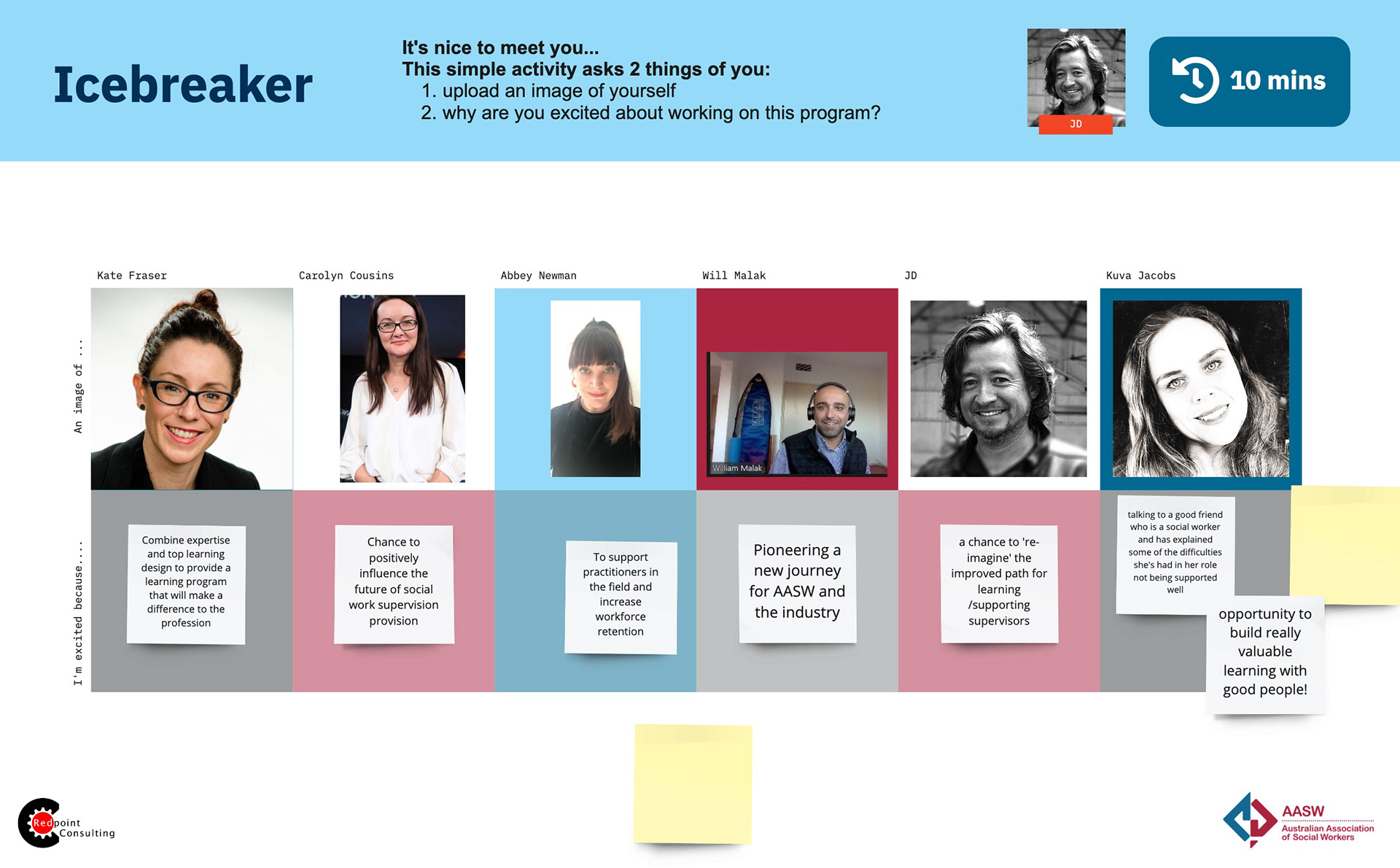
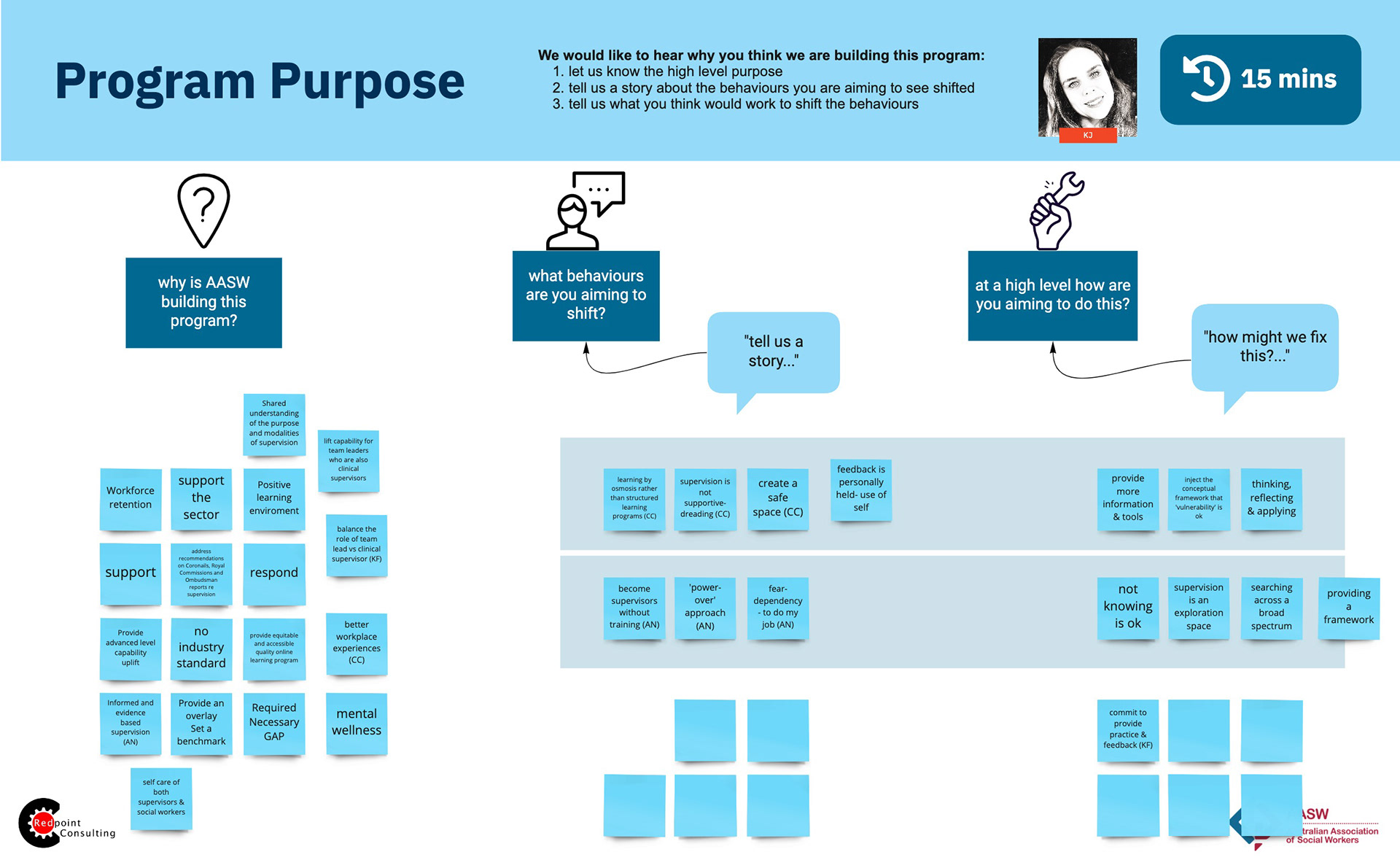
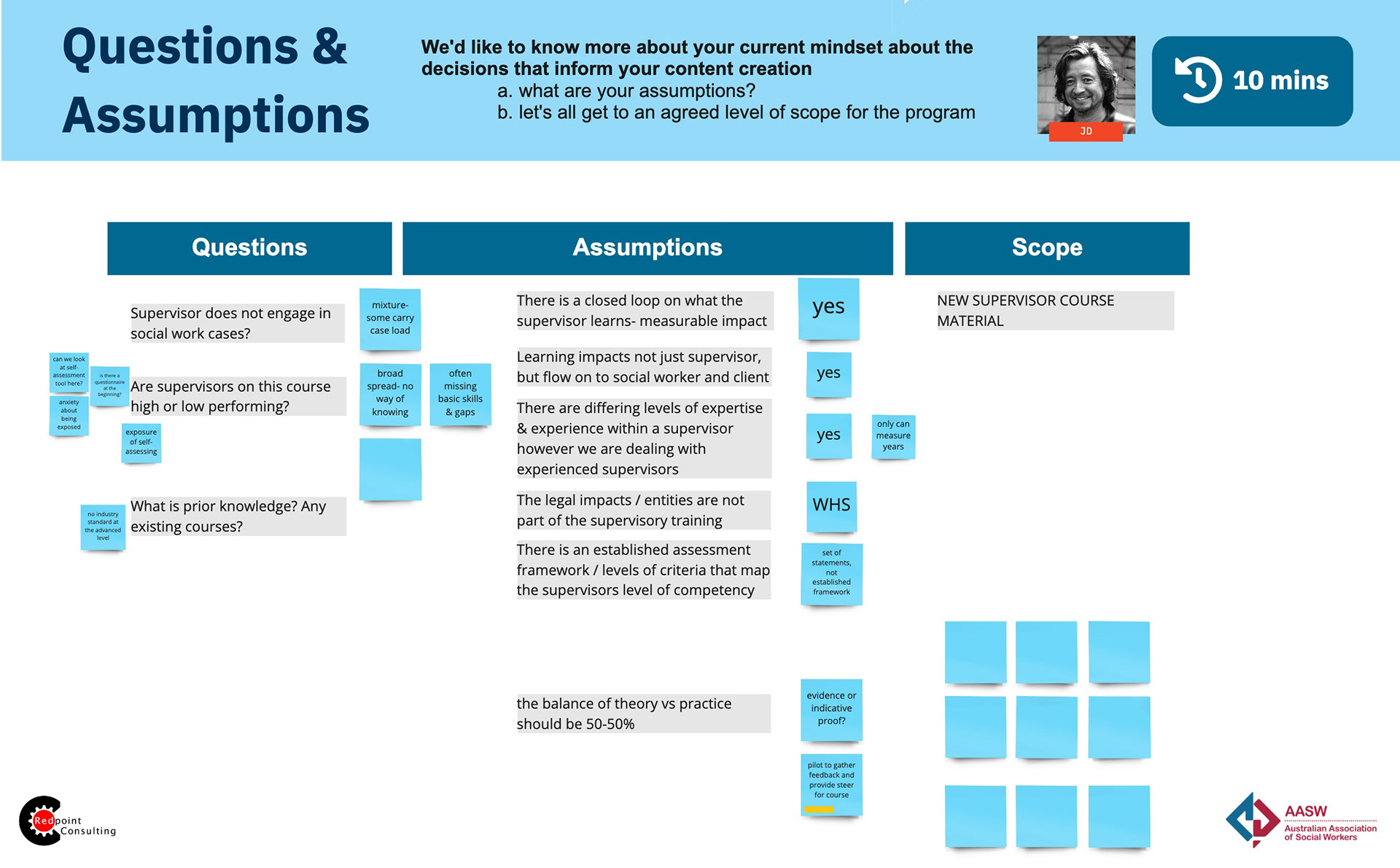
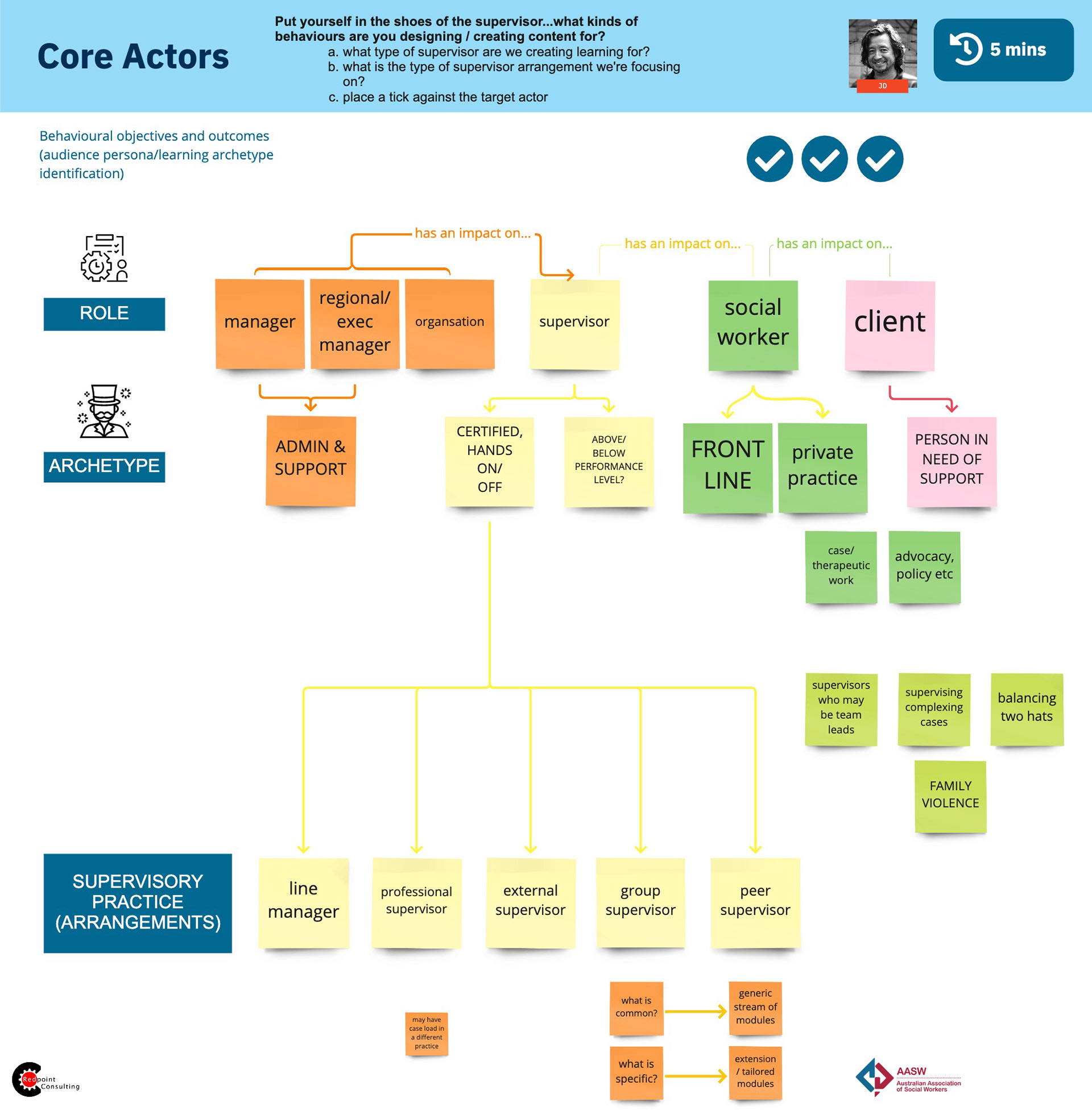
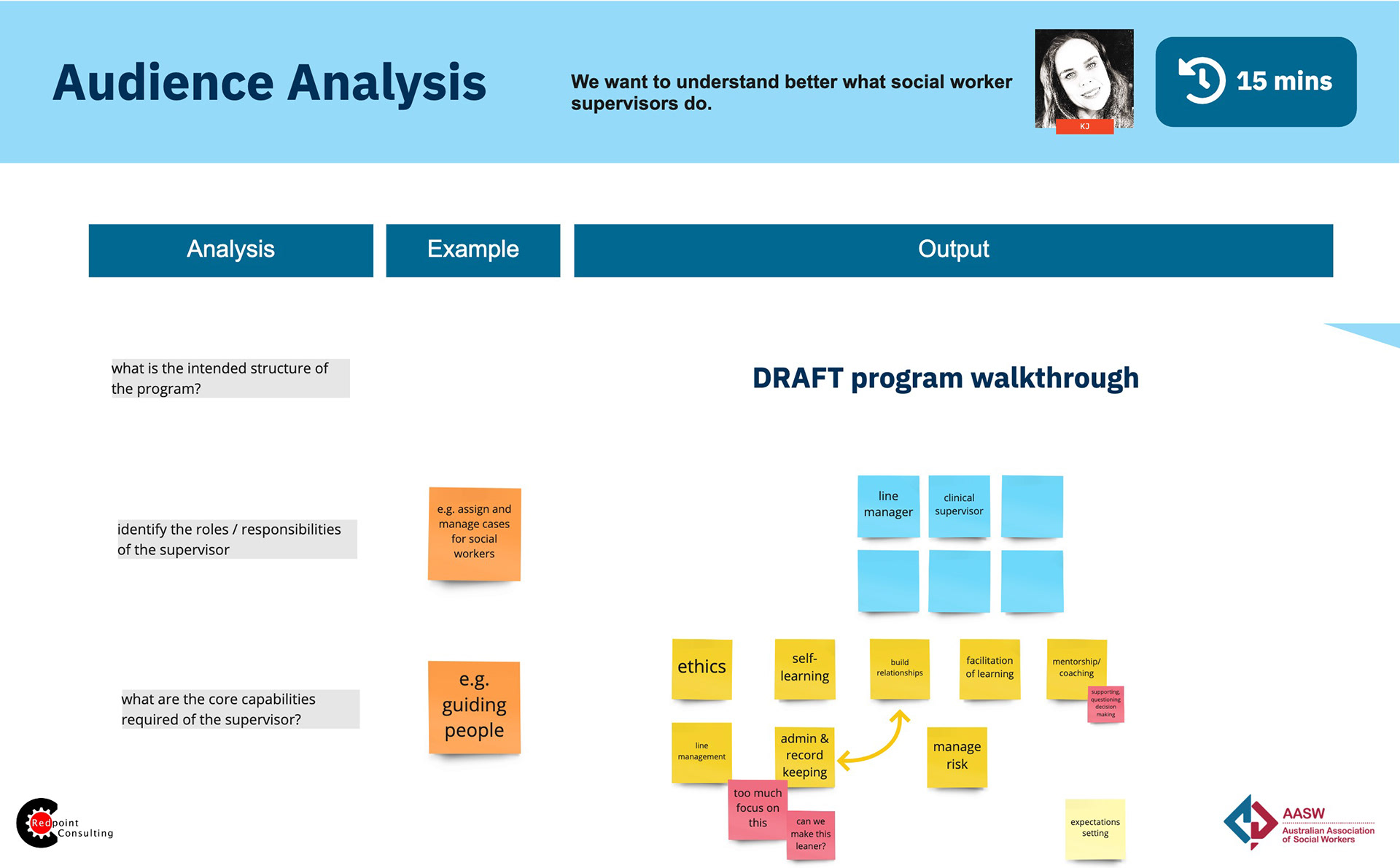
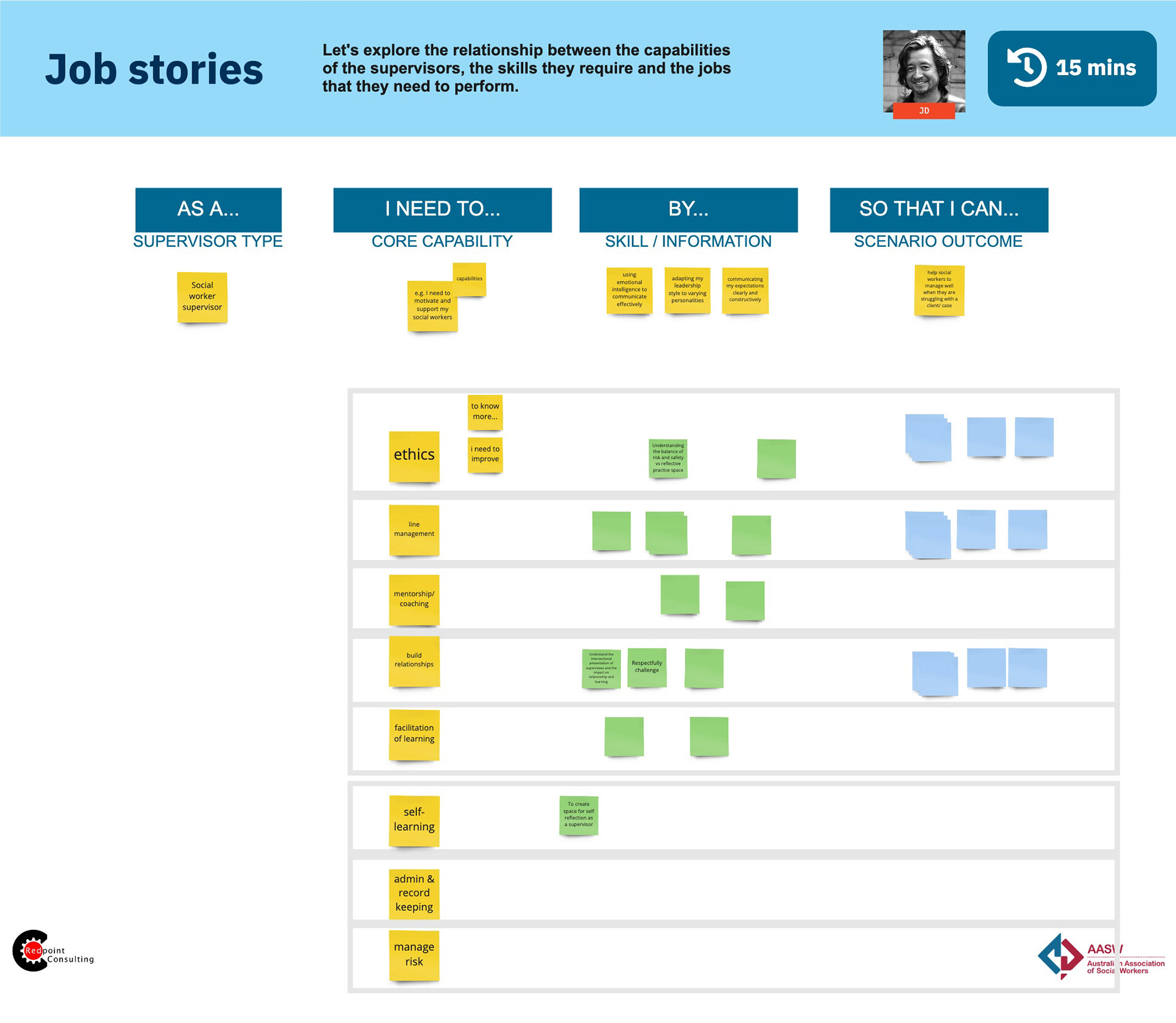
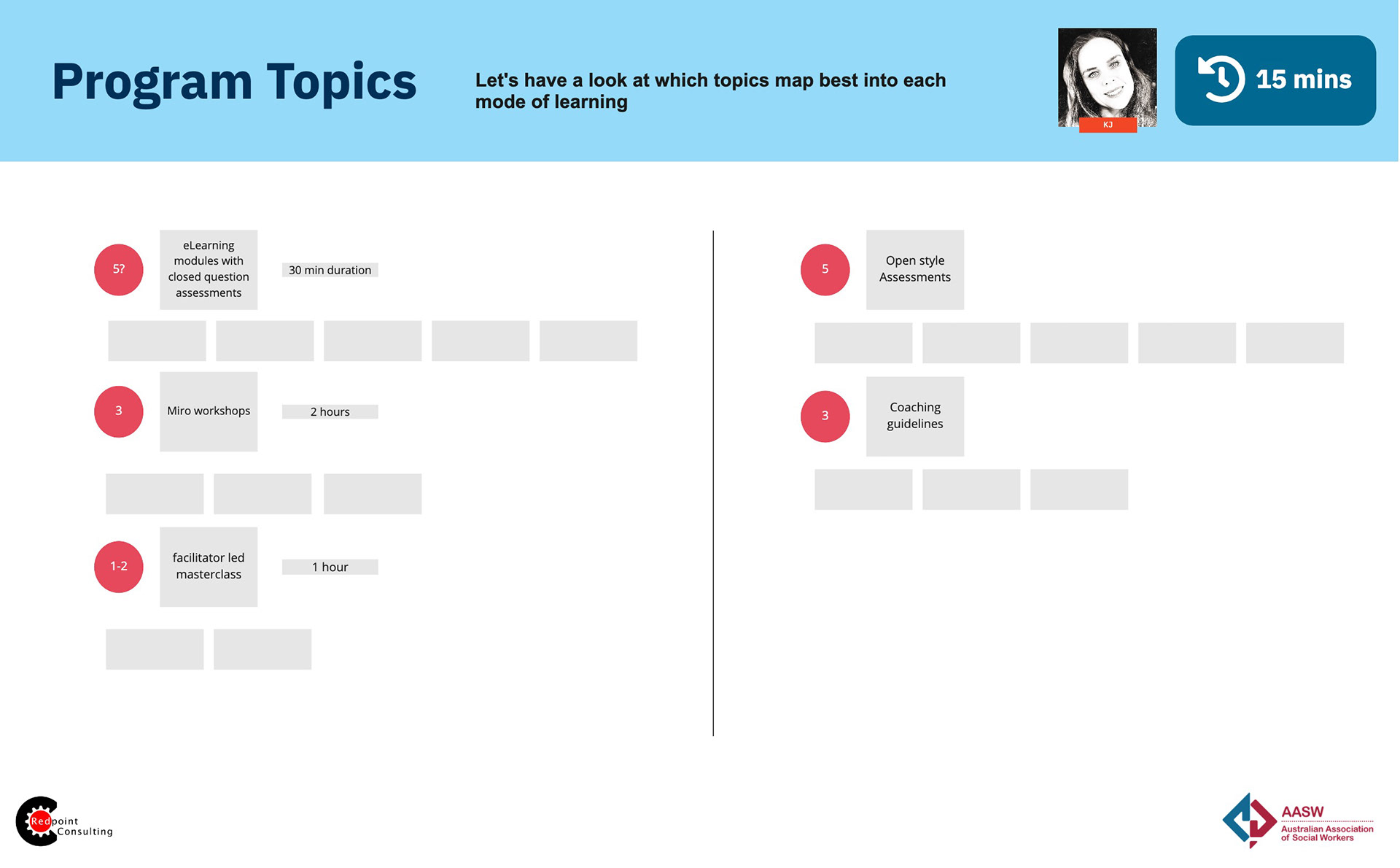
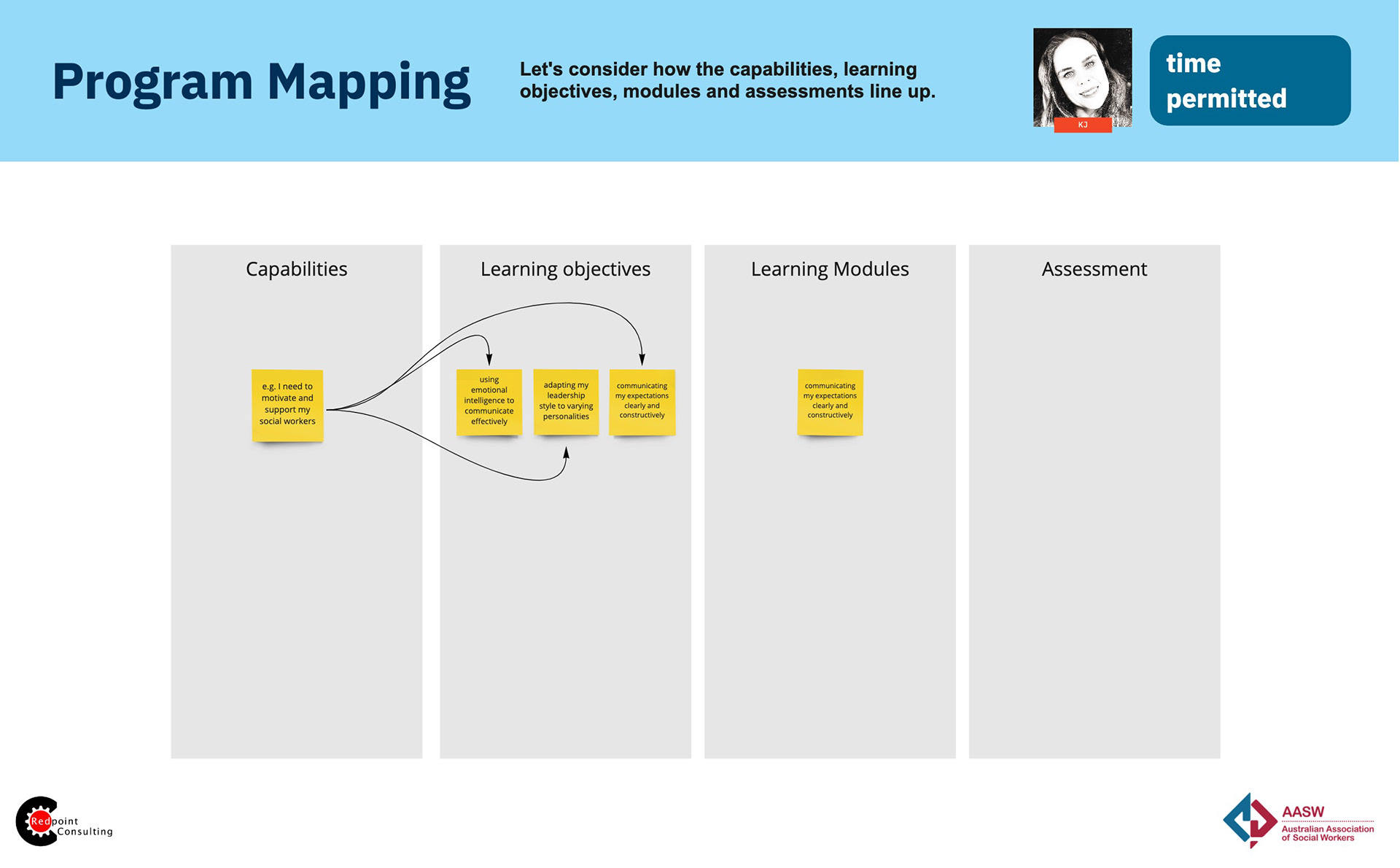
[screens above] – Miro board assets for the 'Discovery' workshop with the program design team
Section 2: The opportunity
What were the identified market or industry drivers?
What were the identified market or industry drivers?
In 2021, the AASW developed an evidence-based advanced supervision program in partnership with State Government Department Family Safety Victoria (FSV) to address key recommendations for this workforce that provides support for adults, children and young people experiencing violence.
Section 3: The challenge
What were the parameters or specific constraints?
What were the target issues to solve?
What were the parameters or specific constraints?
What were the target issues to solve?
AASW sets the standards for the social work profession, and best practice supervision is critical for quality, ethical and accountable service provision, to safeguard the most vulnerable members of our community.
Good supervision enhances the capabilities of frontline workers to achieve safe and positive outcomes for the people they work with. It engages frontline workers in professional learning and provides professional support for workers in personally taxing and challenging roles.
Good supervision enhances the capabilities of frontline workers to achieve safe and positive outcomes for the people they work with. It engages frontline workers in professional learning and provides professional support for workers in personally taxing and challenging roles.
Many frontline workers also hold the role of team leader, which is different to their vital clinical supervisory role where they rely on building trust, and a safe space for developmental and transformational conversations to take place.
Over the last 8-10 years Coronial (Valentine, Mundy, Howard and McPherson Smith, Napier) Royal Commission (Victorian Royal Commission into Family Violence) and State Ombudsman reports have collectively stated key recommendations specifically about clinical supervision of frontline workers:
• Supervisors of frontline workers need more training and support
• Supervisors are providing clinical supervision to advanced practitioners, managing complex cases, and increasing amounts of them
• Supervisors are also team leaders and the dual roles conflict and are challenging to navigate
Over the last 8-10 years Coronial (Valentine, Mundy, Howard and McPherson Smith, Napier) Royal Commission (Victorian Royal Commission into Family Violence) and State Ombudsman reports have collectively stated key recommendations specifically about clinical supervision of frontline workers:
• Supervisors of frontline workers need more training and support
• Supervisors are providing clinical supervision to advanced practitioners, managing complex cases, and increasing amounts of them
• Supervisors are also team leaders and the dual roles conflict and are challenging to navigate
Our literature review of social work clinical supervision additionally highlighted:
• Most clinical supervisors learn their craft on the job, without formalised learning
• Those who hold dual positions of being team leader and clinical supervisor found this very challenging
• There had been a shift from the organisation providing clinical supervision to individuals having to seek it out themselves
• Opportunities for supportive and reflective supervision ‘diminish” when a worker is promoted to a managerial role
• Supervisors need their own supervisory space to manage the emotional load of their work, critically reflect and continue to learn
• Most clinical supervisors learn their craft on the job, without formalised learning
• Those who hold dual positions of being team leader and clinical supervisor found this very challenging
• There had been a shift from the organisation providing clinical supervision to individuals having to seek it out themselves
• Opportunities for supportive and reflective supervision ‘diminish” when a worker is promoted to a managerial role
• Supervisors need their own supervisory space to manage the emotional load of their work, critically reflect and continue to learn
Section 4: Hypotheses
What were the assumptions about the project?
What were the target issues to solve?
What were the assumptions about the project?
What were the target issues to solve?
During the 2020/2021 lockdowns and pandemic the Victorian family violence and sexual assault services were experiencing unprecedented pressure due to increased workload and volume. Frontline workers have never been in more demand, or under supplied, and desperately need support in the form of quality clinical supervision.
Furthermore, during the 2021 Victorian lockdown frontline workers and supervisors experienced difficulty gaining access to training that was relevant, quality, accessible and at an advanced level.
Furthermore, during the 2021 Victorian lockdown frontline workers and supervisors experienced difficulty gaining access to training that was relevant, quality, accessible and at an advanced level.
Prior to the program, participant survey results further supported the need for this program with 52% participants had 6+ years of experience in supervisory role, and 85% of participants rating their knowledge of clinical supervision at a 5 or below out of 7.
Participants identified their number one challenges when providing supervision in their workplace:
• Managing Time / Less time to prepare for supervision
• Reflective Practice
• Difficult Conversations
• Addressing Underperformance
• Getting more resources
Based on these challenges and the recommendations arising from Coroners’ and Royal Commission report, there was an urgent need for the AASW to develop an advanced supervision program to increase the capabilities within this sector to ensure effective supervision of frontline workers.
Participants identified their number one challenges when providing supervision in their workplace:
• Managing Time / Less time to prepare for supervision
• Reflective Practice
• Difficult Conversations
• Addressing Underperformance
• Getting more resources
Based on these challenges and the recommendations arising from Coroners’ and Royal Commission report, there was an urgent need for the AASW to develop an advanced supervision program to increase the capabilities within this sector to ensure effective supervision of frontline workers.
A key success factor of the program was to ensure that it was pitched at an advanced level and customised to the family violence and sexual assault sectors. Therefore, the selection of SMEs and facilitators, and their relevant experience and relatability was essential.
Also essential to the program was creating a “circle of trust”, so that participants felt safe and comfortable in sharing their own experiences and challenges. The facilitators led by example in creating a safe place for the transfer or learning, ensuring participants not only gained from the formal learning content, but from the experiences of their peers, all achieved within a virtual environment.
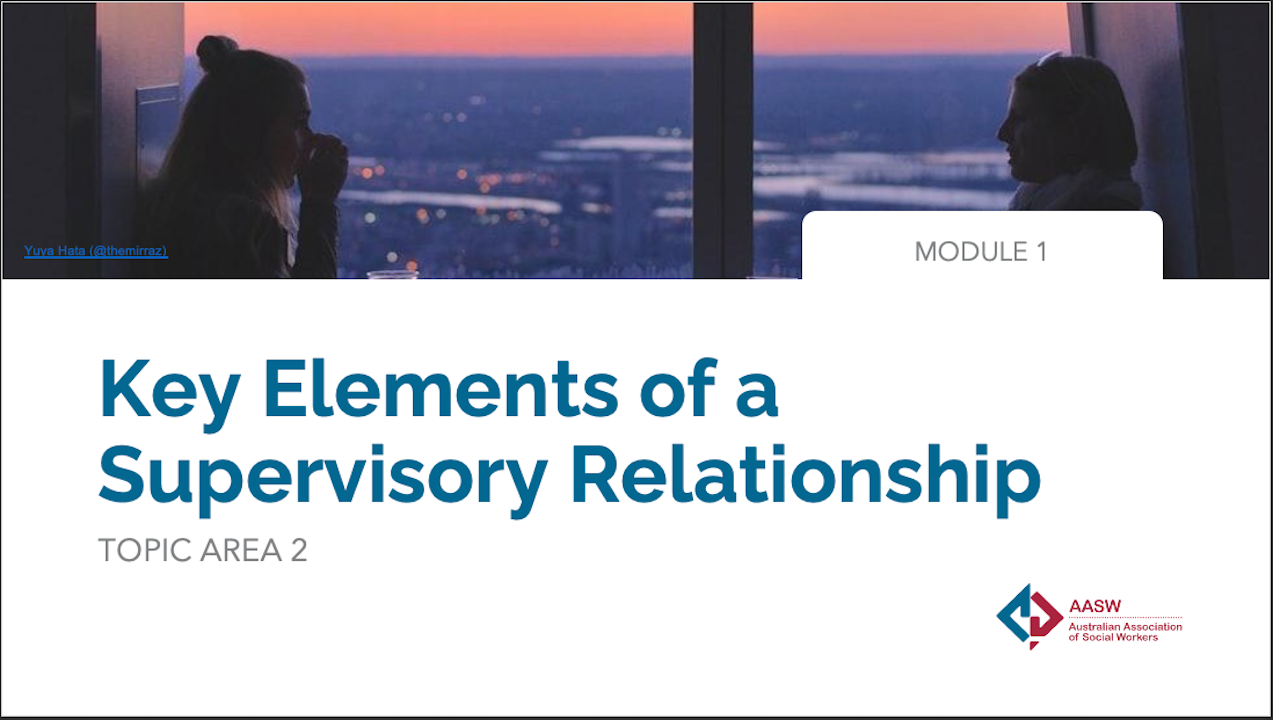
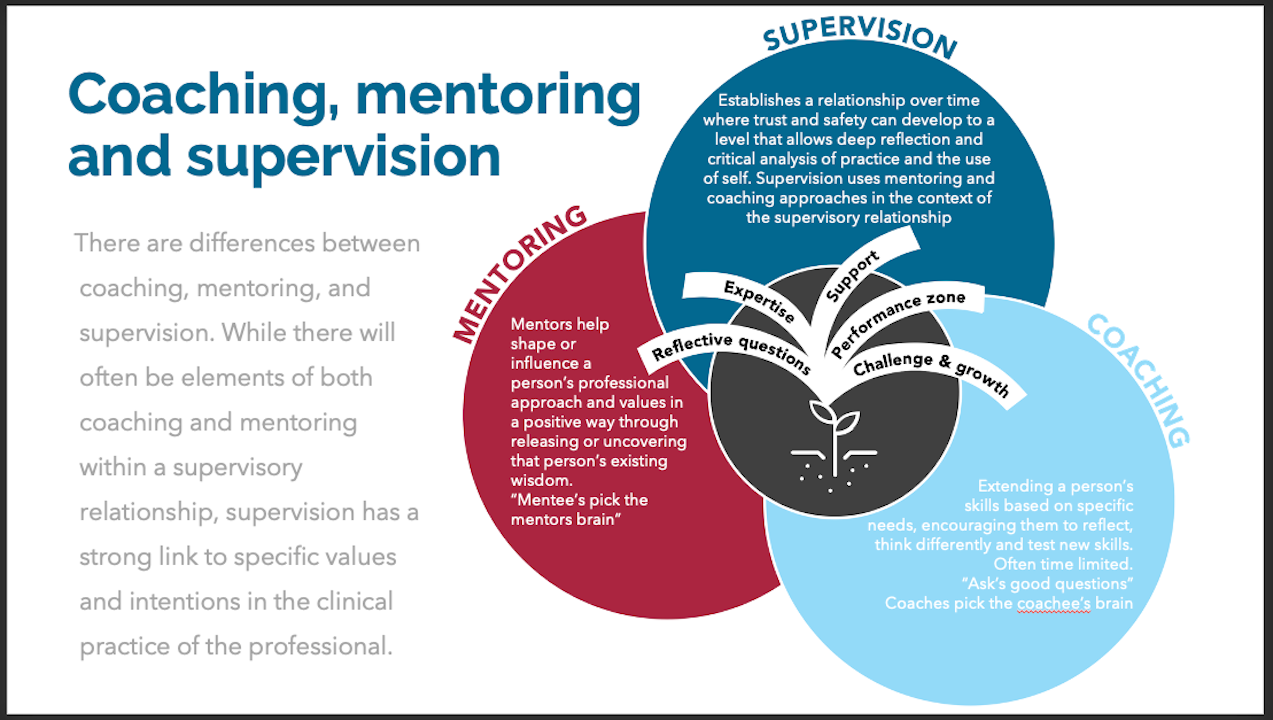
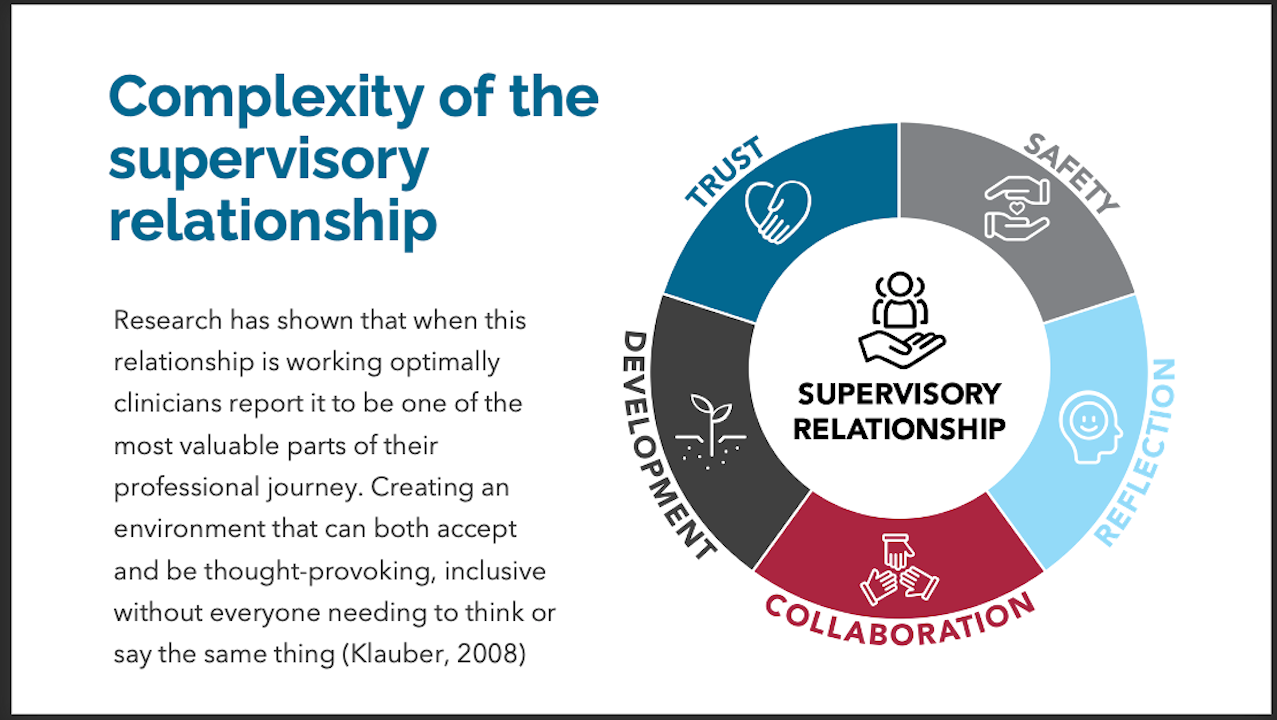

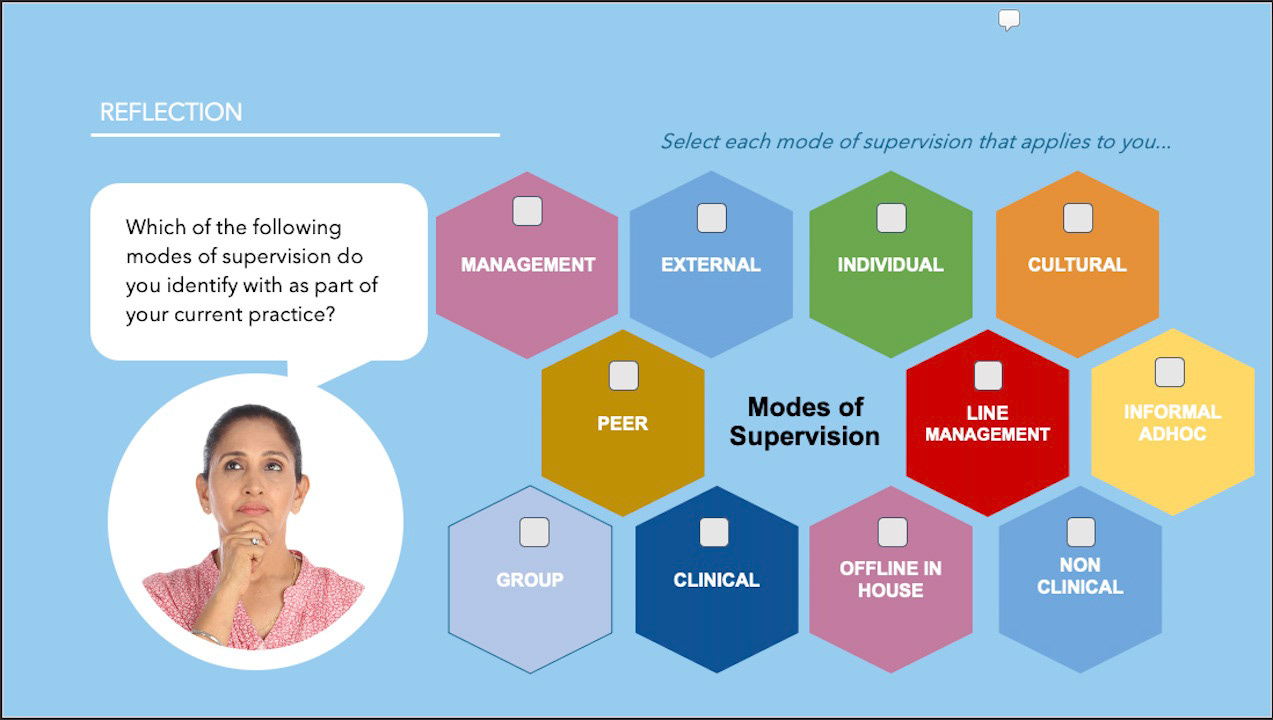
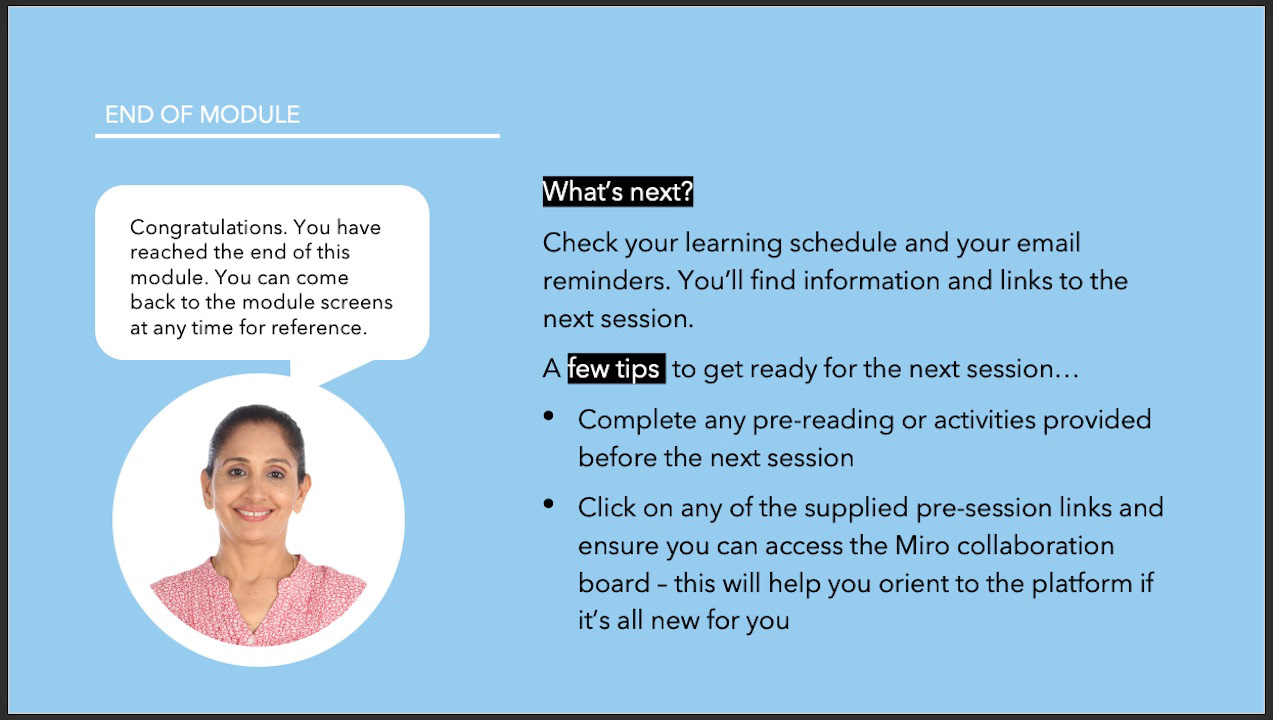
Screens above – storyboard files for eLearning module
Section 5: the Activities
The supporting frameworks, approach to learning, tools and methods...
The supporting frameworks, approach to learning, tools and methods...
AASW partnered with FSV to develop a learning program that supported the delivery of the Family Violence Rolling Action Plan 2020-2023, setting and delivering on key initiatives to improve family violence services for the Victorian community.
The pilot program was customised to the Family Violence and Sexual Assault sectors in Victoria through alignment with the MARAM Framework which was borne from a recommendation from the 2016 Royal Commission and enables a system-wide shared understanding of family violence.
AASWs program was customised to this sector for the pilot delivery, however a fundamental consideration when developing the program was ensuring that it can be customised and contextualised so that we can continue this important work in other areas of the profession such as child protection, disability, health services, and social services.
The program was designed as a spaced program to allow for reflection, implementation and embedding into work practices, and delivered approximately 3hours of learning each week with reflection activities, activities, and knowledge checks.
It was important that the design had multiple modes of delivery to enable individual learning, as well peer support, best practice sharing and collaboration. The following learning environments were used as part of the program:
• eLearning modules: Self-paced online learning, delivered through an online LMS to provide grounding information in models and theories, set a level knowledge base and enable participants to connect content to their own professional contexts, Content includes activities as case-study analysis, reflection, and self-knowledge checks.
• Masterclass Workshop: Online workshops targeted to the specific learning needs of participants. In collaboration with participants, facilitators provided context, elaborated upon ideas, applied theory into practice, and discussed questions and issues.
• Coaching Circle Workshop: Small group online workshops in which facilitators created a ‘trust circle’ of peer discussions, participants explored challenges and complexities of their professional roles through sharing their lived knowledge and experience.
• Collaborative Whiteboarding Workshop: Online workshops in which facilitator led participants into mapping ideas into practice through a process of visual co-collaboration, using digital boards, sticky notes, grouping and sharing knowledge.
• Self-assessment questionnaire: Based on the AASW social Work Capability Framework, participants evaluated and reflected on their strengths and development gaps in providing clinical supervision
• eLearning modules: Self-paced online learning, delivered through an online LMS to provide grounding information in models and theories, set a level knowledge base and enable participants to connect content to their own professional contexts, Content includes activities as case-study analysis, reflection, and self-knowledge checks.
• Masterclass Workshop: Online workshops targeted to the specific learning needs of participants. In collaboration with participants, facilitators provided context, elaborated upon ideas, applied theory into practice, and discussed questions and issues.
• Coaching Circle Workshop: Small group online workshops in which facilitators created a ‘trust circle’ of peer discussions, participants explored challenges and complexities of their professional roles through sharing their lived knowledge and experience.
• Collaborative Whiteboarding Workshop: Online workshops in which facilitator led participants into mapping ideas into practice through a process of visual co-collaboration, using digital boards, sticky notes, grouping and sharing knowledge.
• Self-assessment questionnaire: Based on the AASW social Work Capability Framework, participants evaluated and reflected on their strengths and development gaps in providing clinical supervision
An important delivery challenge was that frontline workers are often drawn to the field due to lived experience or may be experiencing workplace related vicarious trauma (trauma related to hearing/being involved in the experiences of their clients). It was imperative that the course be delivered in a way that maximised the participants’ psychological safety. A trauma informed approach to learning design was implemented along with upfront acknowledgement of trauma and lived experience, encouraging any participants who were challenged or triggered by the course content or activities to speak up or reach out privately. The topics of psychological safety, trauma and lived experience were also covered extensively. This was a crucial aspect of the design, so that participants weren't left alone in the virtual environment, knew where to seek support, and facilitators were briefed and supported to look out for digital body language and follow up with participants who may be struggling.
Contextualisation to the family violence and sexual assault sector in Victoria was crucial to success, and the complexity of case studies, coaching circles, masterclass format satisfied the advanced level requirement for the program. FSV provided policy officers and sector representatives to review key components and provide guidance in navigating the sector.
The learning was developed around two frameworks:
• Core skills of supervisors, using AASW Capability framework
• Framework developed by SMEs to represent the supervisory relationship based on Trust, Safety, Reflection, Collaboration and Trust.
• Core skills of supervisors, using AASW Capability framework
• Framework developed by SMEs to represent the supervisory relationship based on Trust, Safety, Reflection, Collaboration and Trust.
A key design requirement was the need to ensure the pilot program was tailored to the Victorian Family Violence and Sexual Assault audience, in particular ensuring alignment with the MARAM Framework. Therefore, the selection of supervision models was tailored to the sector by presenting a handful relevant to the audience, rather than all models available.
Screen above – collaborative activities whiteboard layout (Miro)
Section 6: the Outcomes
Evidence gathered from tests, solutions & iterations, user/people testing results, process improvements, innovations...
Evidence gathered from tests, solutions & iterations, user/people testing results, process improvements, innovations...
|“The program has a nice balance between e-learning work as well as practice related
|discussions with colleagues that were facilitated beautifully by a highly experienced |social worker who took us on the journey of unpacking all the nuances of supervision |in the family violence practice context.”
|~ Participant testimonial #1
|discussions with colleagues that were facilitated beautifully by a highly experienced |social worker who took us on the journey of unpacking all the nuances of supervision |in the family violence practice context.”
|~ Participant testimonial #1
Increasing Supervision capabilities of social workers is key to the AASWs 2021-2023 Strategic Plan, and fostering a well-trained and highly skilled social work profession. Social workers comprise a large percentage of the frontline workforce.
The learning objectives of the program are relevant across all social work sectors, and evidence is clear that there is a critical need for up-skilling and focus on:
• Increase in the supervision knowledge, skills, and capabilities of participants, pitched at an advanced level.
• Explore the different purposes and possibilities that can be fulfilled in the supervisory relationship
• Consider the impact of learning styles on self and others in supervision
• Analyse the role of reflection and emotional intelligence in supervision
• Consider the conditions required for a safe and reflective experience and what can get in the way
• Develop a clear supervision provision statement and identify areas for further learning and reading around supervision.
We have also identified a clear need for a credential to ensure social work supervisors continue their learning beyond their degree in social work into more specialised and advanced skills. The AASW is currently developing a Supervision credential to recognise advanced capabilities across the profession, which will be launched later this year.
FSV are the owners and drivers of the 10-year plan: ‘Ending Family Violence: Victoria’s plan for change, some of their targets include:
• No woman or child is killed as a result of family violence.
• More women and children at risk of family violence will be able to access effective early interventions.
• A significant reduction in the number of child protection reports that are substantiated.
• Family violence reoffending will be eliminated.
An uplift in the supervision capabilities of experienced frontline workers, is a vital step in meeting this fundamental reform and make good process for the sector.
|"I really valued differing mediums - from the well-constructed e-learning modules, |the provision of resources, the accountability of providing feedback and engaging in |discussions as well as the facilitator guided discussions."
|~ Participant testimonial #2
|~ Participant testimonial #2
Section 7: the Impact
Evidence gathered from ‘in-market’ exposure to real customers/users, business value accumulated – loyalty (increase in customer/user numbers, increase in revenue, identified behaviour change/s...
Evidence gathered from ‘in-market’ exposure to real customers/users, business value accumulated – loyalty (increase in customer/user numbers, increase in revenue, identified behaviour change/s...
The Advanced Supervision program was intentionally first rolled out in pilot format to allow for robust feedback gathering and evaluation. AASW and FSV collaborated to design the evaluation in order to gain data on sector capabilities. Participants were informed that the program was a pilot and were offered places free-of-charge in exchange for critical feedback.
A formal evaluation structure was implemented to understand how well the program met its goals and learning outcomes. Three stages of feedback collated from the participants were: pre-survey, module specific survey after each module and post survey.
Overall, the feedback from participants was as follows:
• 94% participants would recommend this learning program to their colleagues
• 88% participants rated the overall program as very valuable / extremely valuable
• 94% participants rated the facilitators knowledge and expertise as very good / excellent
• 81% participants rated the eLearning tool as very good / excellent
Participants had the following to say about the program:
|"I feel more confident saying the clinical supervision aspect of my role as I am |applying my learnings and not falling back to old patterns of only focusing on |operational. I have already started implementation and I am finding myself enjoying |supervision more as well.."
|~ Participant testimonial #3
|~ Participant testimonial #3
|"I have been providing supervision in human service work for a long time and this |training affirmed what I do well, updated my theoretical framing and inspired me to |ensuring I bring a learning mindset to the supervision, recognising and confirming |my responsibilities. Wonderful training and will recommend in my field of practice!"
|~ Participant testimonial #4
|~ Participant testimonial #4
|" I have been more careful about supervision and ensuring that I am providing |clinical supervision. I am also working towards linking more theory and framework to |the supervision as well. I have also started implementing less operation as well as I |hold a dual role."
|~ Participant testimonial #5
|~ Participant testimonial #5
|"My supervisees have been enjoying how supervision has been going with the |changes that I made."
|~ Participant testimonial #6
|~ Participant testimonial #6
|"This program updated my theoretical framing and inspired me to ensuring I bring a |learning mindset to the supervision, recognising and confirming my responsibilities."
|~ Participant testimonial #7
|~ Participant testimonial #7
A formal evaluation report was provided to FSV post the pilot program completion that captured the successes, challenges and future recommendations. The pilot evaluation was shared by FSV with the other peak bodies in Victoria to discuss the future implementation of the program.
The feedback gave strong evidence that the program made a measurable impact in the way that the participants approached their supervision, and gave them tangible, and actionable takeaways. We were very pleased to see such good feedback across both cohorts given this was the first program deployment, first ever virtual blended program in advanced level supervision, supporting our goal to increase the capabilities of these sectors.

